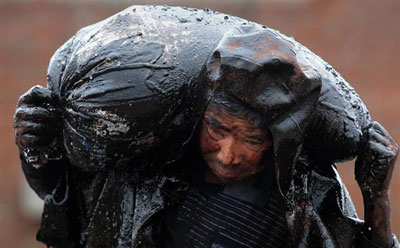Recent Environmental Accidents Inevitable

During the past half month in China environmental accidents have been on the rise.
In the evening of July 28, a severe flood which had begun six days before in northeast China's Jilin City washed 7,000 chemical barrels into the Songhuajiang River, reminding us of a similar heavy chemical pollution spill in this river five years ago.
Also on July 28, a chemical plant located in Nanjing city in Jiangsu Province exploded, causing 13 deaths and leaving around 500 injured.
"Although it appears to be an accident caused by flood, it was in some ways, inevitable," Ma Jun, director of the Institute of Public Environmental Affairs, an NGO located in Beijing, said when talking about the chemical spill.
In fact, the Jilin Xinya Qiangsheng Chemical Company, the owner of those 7,000 chemical barrels, has a bad record of environmental protection. In 2006, it was required by the local government to stop production because the amount of pollutants contained in its waste had exceeded the standard set by the Ministry of Environmental Protection.
Jilin and Nanjing are not alone.
On July 18, some oil pipes in the city of Dalian in Liaoning Province exploded, causing 1,500 tons of crude oil to spill into the Huanghai Ocean polluting an area of around 100 square kilometers.
Only three days before that incident, Tingjiang, one of the four longest rivers in Fujian Province, was severely polluted by waste discharged by Zijin Mining Group, a world-leading mining giant. Fish have been found dead and local residents are too scared to drink water from the river.
Many chemical projects have been started in China in recent years. Statistics from the Ministry of Environmental Protection show that there were 7,555 chemical projects being constructed in 2006 with a total investment of one trillion yuan. This phenomenon is common in a developing country, but, the questions remain: Why did the enterprises choose to place their factories near local rivers or lakes? And, how did they manage to get past regulation set by central and local governments?
"Currently, China has entered a phase of frequent environmental accidents. With a fast growing economy, systematic risks of environmental accidents brought about by unscientific placement and industrial structure will replace individual pollution to become the No.1 threat to our country's environmental safety.” This warning was stated by Pan Yue, Deputy Minister of Environmental Protection in 2006. What he was worried about then has now come true.
According to the monitoring data gained by the Ministry of Environmental Protection in 2006, of all the 7,555 chemical projects which were under construction, 81 percent were located near water areas or in densely populated areas, and 45 percent were considered as high risk sources of environmental disasters.
Aside from being located near waterways, some companies even place their chemical plants in residential communities. This is why the explosion in Nanjing city claimed so many lives.
As for the second question, (How did the enterprises manage to get past regulation set by central and local governments?) one answer is that those enterprises have greatly contributed to local financial revenue. For example, taxes paid by Zijin Mining Group amount to 60 percent of the total financial revenue of the local county where their mines are located.
Another possible reason lies in the close connection between those enterprises and local officials. For example, the chairman of Zijin Mining Group, Lin Shuiqing, is the former member of the Standing Committee of CPC Shanghang County and one of Zilin Mining Group’s supervisors, Lin Xinxi, was once the deputy secretary of the local commission for discipline inspection.
Ma Jun said, one thing responsible for those accidents are the difficulties the public in China face in supervising those enterprises which may cause pollution since the latter have to responsibility to release information concerning environmental protection. He said, in western countries, all the firms that emit pollutants into the environment have to regularly publicize their emission data.
"We need to import social supervision instead of only relying on the government,” Ma said.
Links and Sources
21st Century Business Herald: 环境风险累积 化工布局亟待调整
China News Service: 南京爆炸事故已导致13人死亡 4300户民众受损
The views posted here belong to the commentor, and are not representative of the Economic Observer |
Interactive
Multimedia

- EEO.COM.CN The Economic Observer Online
- Bldg 7A, Xinghua Dongli, Dongcheng District
- Beijing 100013
- Phone: +86 (10) 6420 9024
- Copyright The Economic Observer Online 2001-2011
















